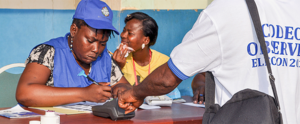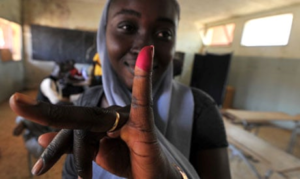
Women’s political participation is a critical component of democratic dialogue and social cohesion. However, from the local to the global level, women’s leadership and political participation are restricted. Women are underrepresented as voters, as well as in leading positions, whether in elected office, the civil service, the private sector or academia. This occurs despite their proven abilities as leaders and agents of change, and their right to participate equally in democratic governance.
Discriminatory social norms restrict women’s role to the private realm of the household: unpaid care work; lack of economic opportunities; social expectations that men are natural leaders, violence against women in public life, and laws and political institutions that disregard women’s rights all further restrict women’s political participation. Women are also less likely than men to have the education, contacts and resources needed to get access to political leadership roles.
Women’s equal political participation requires that more women are present in national parliaments, local councils and community associations. To make this a reality, the barriers to women’s participation have to be removed.
Women are often dynamic leaders of change, galvanizing women and men to get involved, claim their rights, strengthen their communities and protect their planet. Their participation is fundamental to democratic governance. Yet women still have far to go towards equal representation in positions of power and leadership, whether in corporate boardrooms or presidential cabinets.
Discriminatory laws and practices hold women back, as do limits on education, income and time away from caregiving. Just over 21 per cent of parliamentarians are women, up from around 11 per cent when the Beijing Fourth World Conference on Women took place in 1995. While women have made inroads in many areas, at the current pace of change, we won’t see gender parity in governments, parliaments or peace tables until the next century.
The Beijing conference agreement, known as the Platform for Action, dubbed women in power and decision-making one of 12 critical areas of concern. It made two essential commitments to change. First, it called for measures ensuring women’s equal access to and full participation in power structures and decision-making. Political quotas or positive measures are examples of these. By reserving seats or candidacies for women, they have driven dramatic increases in the number of women leaders in some countries. Second, the Platform urged steps to increase women’s ability to participate. Training on leadership, public speaking and political campaigning, for instance, grooms women to compete, win and be good leaders who can inspire others.
Women have a right to equal participation. Once in leadership roles, they can make a difference that benefits whole societies. The Inter-Parliamentary Union has found that women politicians give more attention to social welfare and legal protections, and improve trust. Taking up the Beijing commitments and rallying around women’s leadership could accelerate progress towards equal participation—right now. We can’t wait until the next century!
Our Approach
 Paving the way for more women in the political, business, and civic arena is an investment in more just, equitable, and peaceful societies. Girls and women have a right to engage in civil society, vote in elections, be elected to government office, serve on boards, and make their voices heard in any process that will ultimately affect them, their families, and their communities. Investing in girls’ and women’s right to political participation is a necessary step to achieving regional gender equality and democratic governance.
Paving the way for more women in the political, business, and civic arena is an investment in more just, equitable, and peaceful societies. Girls and women have a right to engage in civil society, vote in elections, be elected to government office, serve on boards, and make their voices heard in any process that will ultimately affect them, their families, and their communities. Investing in girls’ and women’s right to political participation is a necessary step to achieving regional gender equality and democratic governance.
Our programmes are guided by regional and international commitments made to women, including the African Charter on Human and People’s Rights
; the Maputo Protocol ; the Convention on the Elimination of All Forms of Discrimination against Women;
African Charter on Democracy, Elections and Governance that upholds women’s right to participate in public life, and the Beijing Platform for Action , which calls for removing all barriers to equal participation; the Millennium Development Goals progress towards gender equality in part by the proportion of women in parliamentary seats.
At AU Watch we have tailored programs that addresses women’s leadership and political participation, in line with the specific context of countries in this diverse region. We do that:
• Working with the AU and AU Member States to the implement the African Charter, the Maputo Protocol, the Convention on the Elimination of All Forms of Discrimination against Women (CEDAW), support temporary special measures and develop gender-informed policies;
• Supporting civil society actions to promote women’s voting rights and increase women’s political participation, leadership and representation.
• Towards these ends, we provide training for women political candidates to help build their capacities, and offer voter and civic education and sensitization campaigns on gender equality. We back gender equality advocates in calling on political parties, governments and others to do their part in empowering women. Other initiatives encourage young men and women to engage in advocacy around making gender equality measures central to public policymaking.
• At AU Watch, we advocate for legislative and constitutional reforms to ensure women’s fair access to political spheres—as voters, candidates, elected officials and civil service members. We collaborate with civil society on programmes so that elections uphold women’s rights, including to vote and campaign free from electoral violence.
Why are women underrepresented?
There are many obstacles that stop women from being involved with decision making at all levels of society. Women who face violence, poverty and discrimination are more likely to be excluded from decision making.
Barriers such as discriminatory laws, lack of education and greater caring responsibilities all restrict women from becoming leaders or voting in elections. Some women aren’t allowed to see their ballot papers, with male family members casting a vote in their name. Women are underrepresented as voters and leaders in governments and communities around the world
When women do run for office, they are less likely to have the contacts and confidence to succeed. And those who do reach leadership positions, can face daily prejudice, harassment and violence.
Why do we need women leaders?
 Democratic governance and human rights are critical components of sustainable development and lasting peace. Countries that have ineffective government institutions, rampant corruption and weak rule of law have a 30-to-45 percent higher risk of civil war and higher risk of extreme criminal violence than other developing countries.
Democratic governance and human rights are critical components of sustainable development and lasting peace. Countries that have ineffective government institutions, rampant corruption and weak rule of law have a 30-to-45 percent higher risk of civil war and higher risk of extreme criminal violence than other developing countries.
To help change this narrative, we are integrating democracy programming throughout our work with women, focusing on strengthening and promoting women’s rights, accountable and transparent governance, and an independent and politically active civil society across all our work. At the same time, we remain committed to fundamental democratic empowerment activities, including supporting free and fair elections, up-to-date technology for new and traditional media, as well as the rule of law. Women have a right to participate fully and equally in public and political life and bring their unique experience to public debates and decisions.
Shifting the power
Countries with democratic freedoms that respect the rights of women are more just, peaceful and stable-and their citizens can fulfil their potential. Through our democracy, human rights and governance programs, AU Watch remains committed to protecting and advancing the rights of women and girls. Women’s public and political participation is more than a numbers game. For women to shape laws and practices they must have real influence over decisions.
To create a 2063 Africa, we need to transform existing systems of discrimination so that women can make decisions at every level of society including at the political level. We’re working with women’s rights organisations and movements to challenge gender roles, stereotypes, attitudes and beliefs and to mobilise women and girls to influence decisions made by those in power.
We are focused on:
• Democratic Governance – Creating spaces for women to speak out and claim their rights. We help to build open, responsive, and accountable institutions at the civil society level that serve the needs and preferences of women;
• Participation – Ensuring that all have the opportunity to participate and have a voice in how they will be governed. We support women leaders to gain the confidence, skills and knowledge to represent other women;
• Civil Society and Independent Media – Defending women’s rights of association and expression, so that they can play a role in their country’s future. We improve the representation of women in the media through training and local leadership, as this is where many of the decisions affecting women’s lives are made;
• Accountability – Holding institutions and people responsible to the rule of law. Through our media, advocacy and education programs, we holding decision makers to account and making sure they respond to women’s priorities and needs, including women with disabilities, from lower classes or castes, and lesbian, bisexual and transgender women. We work we communities to challenge and change attitudes towards women.
Useful Links